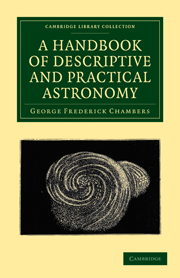Book contents
- Frontmatter
- PREFACE
- SUPPLEMENT
- Contents
- LIST OF ILLUSTRATIONS
- PRINCIPAL AUTHORITIES
- Errata
- A Handbook of Descriptive and Practical Astronomy
- BOOK I A SKETCH OF THE SOLAR SYSTEM
- BOOK II ECLIPSES AND THEIR ASSOCIATED PHENOMENA
- CHAPTER I GENERAL OUTLINES
- CHAPTER II ECLIPSES OF THE SUN
- CHAPTER III THE TOTAL ECLIPSE OF THE SUN OF JULY 28, 1851
- CHAPTER IV THE ANNULAR ECLIPSE OF THE SUN OF MARCH 14–15. 1858
- CHAPTER V THE TOTAL ECLIPSE OF THE SUN OF JULY 18, 1860
- CHAPTER VI HISTORICAL NOTICES
- CHAPTER VII ECLIPSES OF THE MOON
- CHAPTER VIII SUGGESTIONS FOR OBSERVING ANNULAR ECLIPSES OF THE SUN
- CHAPTER IX TRANSITS OF THE INFERIOR PLANETS
- BOOK III THE TIDES
- BOOK IV MISCELLANEOUS ASTRONOMICAL PHENOMENA
- BOOK V COMETS
- BOOK VI CHRONOLOGICAL ASTRONOMY
- BOOK VII THE STARRY HEAVENS
- BOOK VIII ASTRONOMICAL INSTRUMENTS
- BOOK IX A SKETCH OF THE HISTORY OF ASTRONOMY
- BOOK X METEORIC ASTRONOMY
- APPENDICES
- INDEX TO SUBJECTS
- INDEX TO NAMES
- Plate section
CHAPTER VI - HISTORICAL NOTICES
Published online by Cambridge University Press: 05 July 2011
- Frontmatter
- PREFACE
- SUPPLEMENT
- Contents
- LIST OF ILLUSTRATIONS
- PRINCIPAL AUTHORITIES
- Errata
- A Handbook of Descriptive and Practical Astronomy
- BOOK I A SKETCH OF THE SOLAR SYSTEM
- BOOK II ECLIPSES AND THEIR ASSOCIATED PHENOMENA
- CHAPTER I GENERAL OUTLINES
- CHAPTER II ECLIPSES OF THE SUN
- CHAPTER III THE TOTAL ECLIPSE OF THE SUN OF JULY 28, 1851
- CHAPTER IV THE ANNULAR ECLIPSE OF THE SUN OF MARCH 14–15. 1858
- CHAPTER V THE TOTAL ECLIPSE OF THE SUN OF JULY 18, 1860
- CHAPTER VI HISTORICAL NOTICES
- CHAPTER VII ECLIPSES OF THE MOON
- CHAPTER VIII SUGGESTIONS FOR OBSERVING ANNULAR ECLIPSES OF THE SUN
- CHAPTER IX TRANSITS OF THE INFERIOR PLANETS
- BOOK III THE TIDES
- BOOK IV MISCELLANEOUS ASTRONOMICAL PHENOMENA
- BOOK V COMETS
- BOOK VI CHRONOLOGICAL ASTRONOMY
- BOOK VII THE STARRY HEAVENS
- BOOK VIII ASTRONOMICAL INSTRUMENTS
- BOOK IX A SKETCH OF THE HISTORY OF ASTRONOMY
- BOOK X METEORIC ASTRONOMY
- APPENDICES
- INDEX TO SUBJECTS
- INDEX TO NAMES
- Plate section
Summary
The earliest eclipse on record is one given in the Chinese history the Chou-king, and which is supposed to refer to the solar eclipse of Oct. 13, 2127 B.C.
One of the most celebrated eclipses of the Sun recorded in history is that which occurred in the year 584 B.C. It is so, not only on account of its having been predicted by Thales, who was the first ancient astronomer who gave the true explanation of the phenomena of eclipses, but because it seems to fix the precise date of an important event in ancient history. It appears that a war had been carried on for some years between the Lydians and Medes; and we are indebted to Herodotus for an account of the circumstances that led to its premature termination.
“In the sixth year, when they were carrying on the war with nearly equal success, on the occasion of an engagement, it happened that, in the heat of the battle, day wag suddenly turned into night (συνήν∊ικ∊ στ∊ τήs μάχηs συν∊στώσηs τήν ήμέΡην έαΠίνηs νύκτα Υ∊νέσθαι). This change of the day, Thales, the Milesian, had foretold to the Ionians, fixing beforehand, this year as the very period in which the change actually took place. The Lydians and Medes, seeing night succeeding in the place of day, desisted from fighting, and both showed a great anxiety to make peace.” A peace was accordingly made and cemented by a marriage. “For, without strong necessity, agreements are not wont to remain firm.”
- Type
- Chapter
- Information
- A Handbook of Descriptive and Practical Astronomy , pp. 125 - 129Publisher: Cambridge University PressPrint publication year: 2010First published in: 1861



